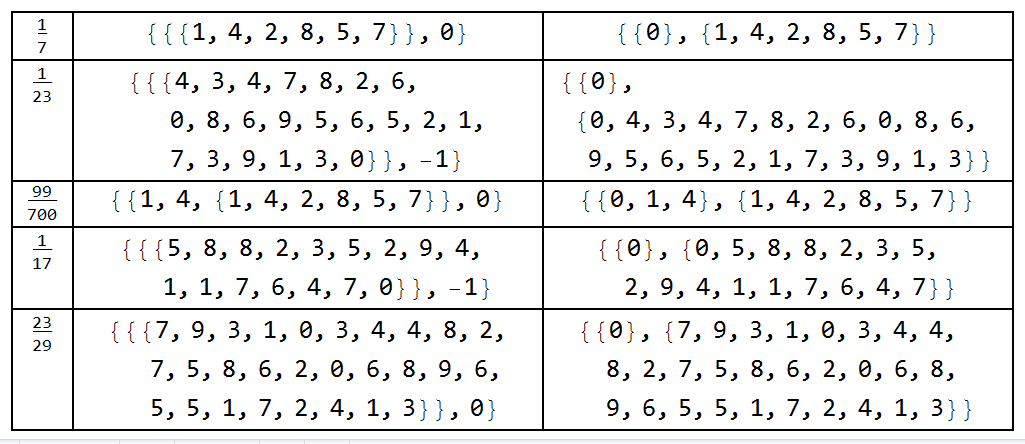This problem can be solved very efficiently using string patterns:
str = ToString[FromDigits@RealDigits[99/700, 10, 24][[1]]];
AbsoluteTiming[StringReplace[str,
StartOfString ~~
pre : Shortest[DigitCharacter ...] ~~
Repeated[rep : Shortest[DigitCharacter ..], {2, Infinity}] ~~
inc : DigitCharacter ... ~~
EndOfString /;
StringMatchQ[rep, inc ~~ __] :> pre <> "(" <> rep <> ")" <> inc]]
{0.00488615, "14(142857)1428"}
Even million of digits takes lesser than 2 seconds to process:
str = ToString[FromDigits@RealDigits[99/700, 10, 1000000][[1]]];
AbsoluteTiming[StringReplace[str,
StartOfString ~~
pre : Shortest[DigitCharacter ...] ~~
Repeated[rep : Shortest[DigitCharacter ..], {2, Infinity}] ~~
inc : DigitCharacter ... ~~
EndOfString /;
StringMatchQ[rep, inc ~~ __] :> pre <> "(" <> rep <> ")" <> inc]]
{1.27581, "14(142857)14"}
What is important, addition of arbitrary integer part doesn't alter the period even if this integer part contains recurring sequence of numbers:
str = ToString[FromDigits@RealDigits[141414141414141414 + 99/700, 10, 1000][[1]]];
AbsoluteTiming[StringReplace[str,
StartOfString ~~
pre : Shortest[DigitCharacter ...] ~~
Repeated[rep : Shortest[DigitCharacter ..], {2, Infinity}] ~~
inc : DigitCharacter ... ~~
EndOfString /;
StringMatchQ[rep, inc ~~ __] :> pre <> "(" <> rep <> ")" <> inc]]
{0.049049, "14141414141414141414(142857)14"}
The crucial part here is pre : Shortest[DigitCharacter ...] which is converted internally to RegularExpression["(\\d*?)"] containing lazy quantifier *?. The algorithm behind this quantifier along with the Condition are what always gives us the optimal (not shifted) recurring period. By introducing pseudo-condition (Print[{pre, rep, inc}]; True) we can observe joint work of them both:
str = ToString[FromDigits@RealDigits[14 + 99/700, 10, 24][[1]]];
StringReplace[str,
StartOfString ~~
pre : Shortest[DigitCharacter ...] ~~
Repeated[rep : Shortest[DigitCharacter ..], {2, Infinity}] ~~
inc : DigitCharacter ... ~~
EndOfString /;
(Print[{pre, rep, inc}]; True) && StringMatchQ[rep, inc ~~ __] :>
pre <> "(" <> rep <> ")" <> inc];
{, 14, 285714285714285714}
{, 14, 14285714285714285714}
{1, 41, 4285714285714285714}
{14, 14, 285714285714285714}
{1414, 142857, 14}
From the above we can clearly see how the lazy quantifier *? works and what is the role of the Condition in rejecting inappropriate matches.
Note that the above condition StringMatchQ[rep, inc ~~ __] isn't sufficiently strict to provide the optimal period without the optimal searching algorithm. For example if we reverse the string and change the condition correspondingly, we get shifted period because now the leading pattern is inc : DigitCharacter ... and hence the search is performed in wrong order:
str = ToString[FromDigits@RealDigits[99/700, 10, 24][[1]]];
StringReplace[StringReverse@str,
StartOfString ~~
inc : DigitCharacter ... ~~
Repeated[rep : Shortest[DigitCharacter ..], {2, Infinity}] ~~
pre : Shortest[DigitCharacter ...] ~~
EndOfString /;
(Print[StringReverse /@ {pre, rep, inc}]; True) && StringMatchQ[rep, __ ~~ inc] :>
inc <> ")" <> rep <> "(" <> pre] // StringReverse;
{, 14, 28571428571428571428}
{14, 142857, 1428571428}
{141, 428571, 428571428}
{1414, 285714, 28571428}
{14142, 857142, 8571428}
{141428, 571428, 571428}
{1414285, 714285, 71428}
"1414285(714285)71428"
With a more rigorous condition StringMatchQ[rep, __ ~~ inc] && UnsameQ @@ StringTake[{pre, rep}, UpTo[1]] we get the optimal result despite the suboptimal searching algorithm:
StringReplace[StringReverse@str,
StartOfString ~~
inc : DigitCharacter ... ~~
Repeated[rep : Shortest[DigitCharacter ..], {2, Infinity}] ~~
pre : Shortest[DigitCharacter ...] ~~
EndOfString /;
StringMatchQ[rep, __ ~~ inc] && UnsameQ @@ StringTake[{pre, rep}, UpTo[1]] :>
inc <> ")" <> rep <> "(" <> pre] // StringReverse
"14(142857)1428"
It is worth to note that Mr.Wizard's elegant solution via the native Mathematica's patterns also can't process correctly the list in the reverse direction. In the following I essentially have changed only the condition in order to allow it to match the reversed list:
Reverse[RealDigits[99/700, 10, 24][[1]]] /.
{inc___, Repeated[rep__, {2, Infinity}], pre___} /;
MatchQ[{rep}, {__, inc}] :> Reverse /@ {{pre}, {rep}, {inc}}
{{1, 4, 1, 4, 2, 8, 5, 7, 1, 4, 2, 8}, {5, 7, 1, 4, 2, 8}, {}}
But it can be cured easily by wrapping pre___ with Shortest:
Reverse[RealDigits[99/700, 10, 24][[1]]] /.
{inc___, Repeated[rep__, {2, Infinity}], Shortest@pre___} /;
MatchQ[{rep}, {__, inc}] :> Reverse /@ {{pre}, {rep}, {inc}}
{{1, 4}, {1, 4, 2, 8, 5, 7}, {1, 4, 2, 8}}
This improved solution also works well with the original list:
RealDigits[99/700, 10, 24][[1]] /.
{Shortest@pre___, Repeated[rep__, {2, Infinity}], inc___} /;
MatchQ[{rep}, {inc, __}] :> {{pre}, {rep}, {inc}}
{{1, 4}, {1, 4, 2, 8, 5, 7}, {1, 4, 2, 8}}
Note that there is no way to cure the string pattern in order to allow it to process the string in the reverse direction the same way as in the forward direction. This illustrates the fundamental difference between string patterns (based on regular expressions) and native Mathematica's patterns. Although one should understand that (at least in the general case) the latter also work differently depending on the direction as can be seen from the following excerpt from the Documentation and proven using ReplaceList (as described here):
If several Shortest objects occur in the same expression, those that
appear first are given higher priority to match shortest sequences.


123123123123123/10^24 + 1234/(10^28 - 1)? I think your problem cannot be solved purely usingShortestandLongest, because you need to check whether the last part (the incomplete recurring period) belongs to the sequence you found. $\endgroup$/;MatchQ[{r},{inc,__}]to deal with it. $\endgroup$